Marvel vs Capcom Origins Review
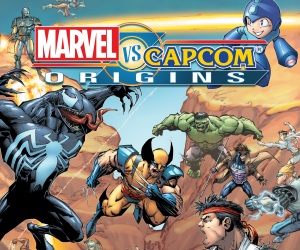 Game: Marvel Vs Capcom Origins
Game: Marvel Vs Capcom Origins
Developer: Capcom
Publisher: Capcom
Available On: Xbox 360, PlayStation 3
Reviewed On: Xbox 360 via Xbox LIVE Arcade
Comic book adaptations are notoriously controversial, in that the source materials are often held in such high regard by fans, that getting something wrong can lead to disapproval on a massive scale. Big hitters like Batman, Spider-Man, The Incredible Hulk and Superman have had mixed fortunes when they have been adapted to other non-print media. For every Dark Knight, Richard Donner’s O.G. Superman movie or Neversoft Spider-Man banger, there have been atrocities like Superman 64, Batman Forever and Ang Lee’s emo Hulk movie. Since they started working with Marvel back in 1993, Capcom have had a far better strike rate when it comes to adapting the characters created by the likes of Stan Lee, Jack Kirby, Steve Ditko and Gerry Conway.
It was Gerry Conway’s brutal Punisher who starred in Capcom’s first foray into comic-book tie-ins. Rather than try and re-invent the wheel, Capsule slotted Punisher and Nick Fury into their successful scrolling fighter template that had served them so well with the likes of Captain Commando and Final Fight. The CP System Dash hardware, which was a Q-Sound-enhanced version of their classic CPS-1 board, was home to three excellent comic-based fighters, the other two being the sublime manga adaptation Tenchi Wo Kurau II and the still-ace Cadillacs & Dinosaurs.
Seeing how well Frank Castle had mixed it up with their side-scrolling gameplay, Capcom decided that their other strong suit – the one on one fighter – would be the perfect platform for more Marvel-based fun times. X-Men: Children of the Atom was the first 2D fighter of this ilk, and followed the same gameplay style as original Capcom IP like Street Fighter II and Darkstalkers. It featured a great selection of X-Men and their foes, in a game which whilst totally kicking ass from a design point of view, with voice actors from the X-Men animated series, and some superb X-Power special moves, was woefully unbalanced. The SEGA Saturn port may as well have had a sticker on it saying “JUST SELECT JUGGERNAUT”, so overpowered was the humongous sub-boss character now selectable in the home versions.
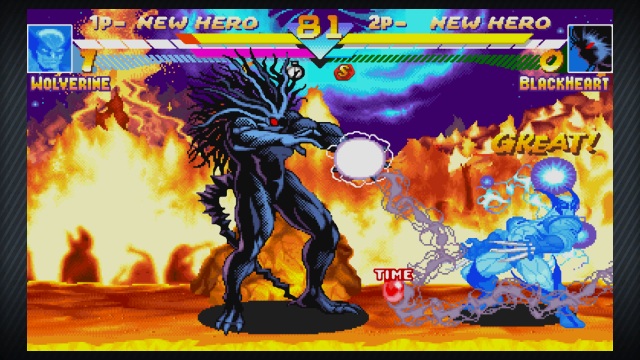
Thankfully, by the time they were looking into producing a follow up game, Capcom had evened things out a bit and introduced some winning new gameplay flourishes to keep things interesting. Who knew where they would take the series next? Well, this nice little HD compilation gives us a few clues, offering up a terrific game that would serve as a precursor to the popular “VS” series, and a great crossover title that would serve as the shape of things to come.
First up, let me tell you what you get for 1200 Microsoft Points. The package includes an arcade-perfect port of both 1995’s Marvel Super Heroes and crossover follow-up Marvel vs Capcom: Clash of Super Heroes from 1998. Both include some (but not all) of the extra characters and features that were present in the home ports, such as including an unlockable Anita from Darkstalkers in MSH, but omitting the four-player Cross Fever mode which was immense fun in the Dreamcast conversion of MvC.
The games come with everything you would expect from an HD makeover. There are a selection of screen options, such as the ability to smooth over sprites rather than retain the jagged originals, and an option to play the game with “scan lines” to mimic the display on an old school arcade monitor. Some of these options, like the ridiculous view which shows the action on an approximation of a curved arcade monitor screen from an over-the-shoulder perspective, should have been canned at development stage. Having said that, there are plenty of options to tinker with, and most players will be able to find a way of stretching and tinkering with the display to suit their fighting needs.
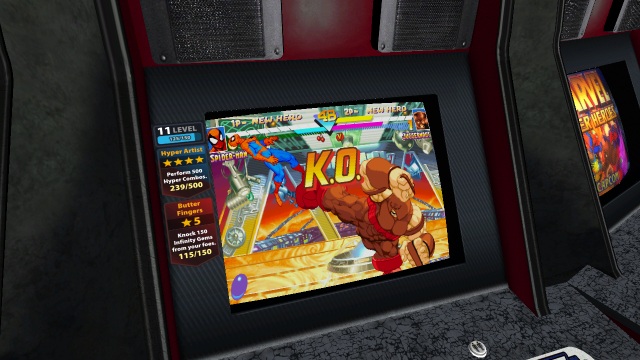
Another nice addition is the way developer Iron Galaxy (who I sincerely hope are named after the spectacular Cannibal Ox joint of the same name) have added some nice little hints and tips into the pause menus; which will tell you the strengths and weaknesses of your characters, or in the case of MSH, highlight the most effective Infinity Gem for each bod.
There is a well-implemented online mode, which features the same technology that made the likes of Street Fighter III Third Strike: Online Edition such a stable and lag free treat. There are a wealth of unlockable extras, which are accessed by earning Vault Points, the in game currency that is earned for performing the vast array of in-game challenges, ranging from the simple “land 100 special moves” type, to carrying out the more difficult crossover attacks or special move cancels in the latter title. The extras are superb, there are ending movies, artwork and extra characters. The in-game challenges are also linked to the Achievements you can unlock, so reaching a certain rank will also earn you some sweet Gamerscore Points.
As for the actual games themselves? Well of course they have both long since been eclipsed by the other games in Capcom’s arsenal. But both are fun, nails-hard, old-school arcade games which feature well-implemented use of characters from the comic book universe and from Capcom’s own games.
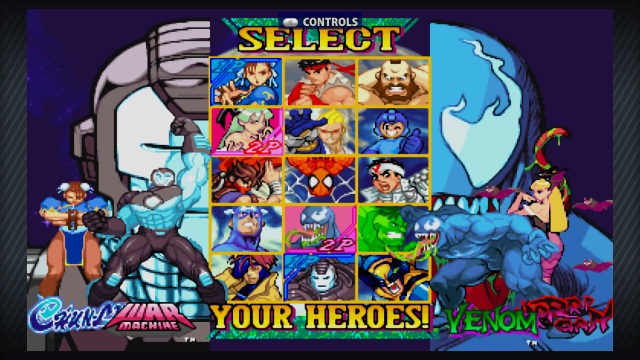
I had forgotten just how much fun Marvel Super Heroes is. From the amusing superhero dialogue (Iron Man’s “Superior tech!” put-down being a favourite), to the huge, well animated sprites; the game is like a bombastic comic book come to life. The character selection is paltry compared to what we would expect from a modern-day fighter, but still filled with interesting selections and no palette swaps to speak of (although Iron Man and Magneto do share some very similar moves). Like the magnificent recent Zen Pinball table I looked at, Thanos looms large over proceedings, and the game is underpinned by a story loosely based on the classic Infinity Gauntlet storyline. What this means is that Infinity Gems are added to the gameplay; collectables on the playing field that can be activated to boost your stats for a brief period. Sure, some of the characters like Tony Stark with his enormous, screen-filling Proton Cannon, and the still-irritating Juggernaut are a bit askew in the balancing stakes, but the gem-grabbing gameplay is genuinely entertaining, and this is the definitive version of a game which I last had to insert a RAM cartridge into a console in order to play.
Marvel vs Capcom suffers by comparison with the recent third and fourth instalments in the series, which featured a much larger roster and the ultimate refinement in the tag-team crossover gameplay that began here. That said, it is still a fine game which introduced the spectacular attacks, tag team assists and excellent interpretations of much loved characters in a 2D fighter style, with particular plaudits going to the way Strider Hiryu was handled.
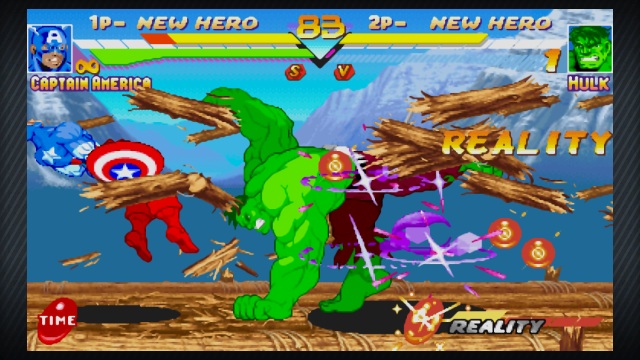
VERDICT: The biggest disappointment with the whole package is that it does not tell the whole story. Whether there were licensing issues, I am not sure, but would it have hurt Capcom to simply gather all of the pre-Marvel vs Capcom 2 titles into one bundle? They did this with PlayStation 2 compilations that gathered all of the Street Fighter Zero and Darkstalkers games onto one disc, so why not do the same for their much loved VS series?
My other bugbear is the lack of any Trials or Missions, something which are now included as standard on fighters and go a long way toward teaching newcomers how to play the game. Iron Galaxy included Trials in their SFIII release, but not here. Given the two wildly different game engines, a mode which encourages practising the various attacks, gem activations, aerial raves and suchlike would have been handy.
For all my moaning, this is still a much better value purchase than the standalone 1200 MS Point version of Marvel vs Capcom 2. Marvel Super Heroes is an incredibly fun title, which I lost five hours to in one sitting the other night with out even realising. Both games feature arcade-style difficulty, and are not easy to beat, with no option to alter the dipswitches in this regard. As such, they hark back to an age where fighters were still king of the arcades, and will appeal to anyone who has a love of the 2D fighter.






